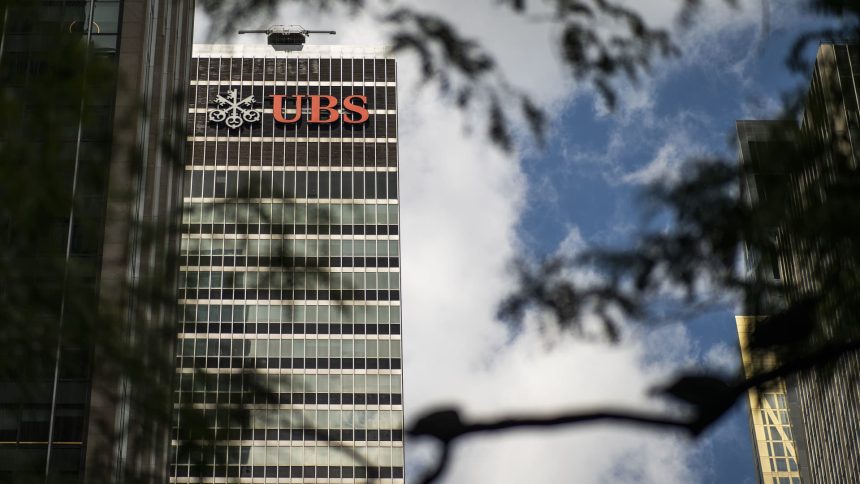UBS shares reached their highest point since late 2008 during early trade in Zurich on Thursday, after the Swiss banking giant posted a mammoth profit beat and announced thousands of layoffs as it plans to fully absorb Credit Suisse’s Swiss bank.
UBS posted second-quarter profit of $28.88 billion in its first quarterly earnings report since Switzerland’s largest bank completed its takeover of stricken rival Credit Suisse.
Analysts had projected net profit of $12.8 billion for the three months to the end of June, according to a Reuters poll.
UBS said the result primarily reflected $28.93 billion in negative goodwill on the Credit Suisse acquisition. Underlying profit before tax, which excludes negative goodwill, integration-related expenses and acquisition costs, came in at $1.1 billion.
Negative goodwill represents the fair value of assets acquired in a merger over and above the purchase price. UBS paid a discounted 3 billion Swiss francs ($3.4 billion) to acquire Credit Suisse in March.
UBS CEO Sergio Ermotti told CNBC’s “Squawk Box Europe” on Thursday that the bank is making “very good progress” with its integration plans.
“When people look into those numbers, they will clearly understand that this negative goodwill is the equity necessary to sustain $240 billion of risk-weighted assets and the financial resources to go through a deep restructuring that is necessary at Credit Suisse, because our analysis has proven that the business model was not viable any longer,” he told CNBC’s Joumanna Bercetche.
“Credit Suisse has excellent people, clients and product capabilities, but the business model was not sustainable any longer and needs to be restructured.”
UBS shares were up 4.9% around an hour into trading.
Here are some other highlights:
- CET1 capital ratio, a measure of bank liquidity, reached 14.4% versus 14.2% in the second quarter of 2022.
- Return on tangible equity (excluding negative goodwill, integration-related expenses and acquisition costs) was 4.3%.
- CET1 leverage ratio was 4.8% versus 4.4% a year ago.
Credit Suisse’s Swiss bank to be fully absorbed
Credit Suisse’s stalwart domestic banking unit will be fully integrated into UBS, the group also announced on Thursday, with a merging of legal entities expected to close in 2024.
The fate of Credit Suisse’s flagship Swiss bank, a key profit center for the group and the only division still generating positive earnings in 2022, was a focal point of the acquisition, with some analysts speculating that UBS could spin it off and float it in an IPO.
Ermotti said the bank’s analysis had determined that this is “the best outcome for UBS, our stakeholders and the Swiss economy.”
The integration may prove more controversial in Switzerland because of the possibility of heavy job losses in the process. UBS confirmed Thursday that the integration of the Swiss bank will result in 1,000 redundancies, beginning in late 2024, while a further 2,000 layoffs are expected due to the wider restructure of Credit Suisse.
The Credit Suisse acquisition was part of an emergency rescue deal mediated by Swiss authorities over the course of a weekend in March. Earlier this month, UBS announced that it had ended a 9 billion franc ($10.24 billion) loss protection agreement and a 100 billion franc public liquidity backstop that were put in place by the Swiss government when it agreed to take over Credit Suisse in March.

“Clients will continue to receive the premium level of service they expect, benefiting from enhanced offerings, expert capabilities and global reach,” Ermotti said of the integration of Credit Suisse’s Swiss banking division.
“Our stronger capital base will enable us to keep the combined lending exposures unchanged, while maintaining our risk discipline.”
The bank also announced that it is targeting gross cost savings of at least $10 billion by 2026, when it hopes to have completed the integration all of Credit Suisse Group’s businesses.
UBS delayed reporting its second-quarter results — initially scheduled for July 25 — until after completing the Credit Suisse takeover on June 12.
In the previous quarter, UBS suffered a surprise 52% annual drop in net profit due to a legacy litigation issue relating to U.S. mortgage-backed securities.
UBS shares closed Wednesday’s trade up nearly 30% since the turn of the year, according to Eikon.
In a separate Thursday filing, the Credit Suisse subsidiary posted a second-quarter net loss of 9.3 billion francs, as it saw net asset outflows of 39.2 billion francs, with assets under management falling 3% amid a mass exodus of clients and staff.
The Thursday report was Credit Suisse’s last as an independent entity, and showed that, despite the rescue, the loss of client confidence that precipitated the bank’s near collapse in March has yet to be reversed.
UBS nevertheless noted that this attrition rate was slowing, and the bank will be keen to retain as many Credit Suisse clients and customers as possible, in order to make the colossal merger work in the long run.
UBS’ Ermotti told CNBC on Thursday that both UBS and Credit Suisse had seen an uptick in deposit inflows in the second quarter and in the current one so far, and that this was evidence that clients are “staying loyal.”
For the second quarter, net inflows into deposits for the combined group were $23 billion, of which $18 billion came from Credit Suisse’s wealth management and Swiss bank divisions.
Though Credit Suisse continued to suffer net asset outflows, UBS said that these slowed over the second quarter and turned positive after the acquisition was completed in June.
“Credit Suisse lost around $200 billion during its difficult times in 2022 and 2023, and we are seeing now some of this coming back, and our goal is to try to get back as much as possible. It’s not easy, but it is our ambition,” Ermotti added.
UBS’ flagship global wealth management business received $16 billion in net new money over the three months to the end of June, its highest second-quarter net inflows for over a decade.
Read the full article here




